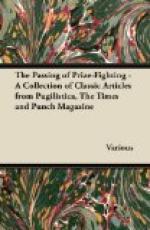One would think that was a pretty decent clincher, by way of a reason for declining the proposed trip to Giles Scroggins’ little property at his own peculiar “Gravesend;” but as contradiction begets controversy, and the enlightened poet is fully aware of the effect of that cause, the undaunted sprite of the interred Giles instantly opposes this, to him, flimsy excuse, and upon the peculiar veracity of a wandering ghost, triumphantly exclaims, in the poet’s words—words that, lest any mistake should arise as to the speaker by the peculiar construction of the sentence, are rendered doubly individual, for—
“Says the ghost, says he, vy that’s no rule!”
There’s a staggerer! being alive no rule for not being buried! how is Molly Brown to get out of that high-pressure cleft-stick? how! that’s the question! Why not in a state of somnolency, not during the “death of each day’s life; no, it is clear, to escape such a consummation she must be wide awake.” The poet sees this, and with the energy of a master-mind, he brings the invisible chimera of her entranced imagination into effective operation. Argument with a man who denies first premises, and we submit the assertion that vitality is no exception to the treatment of the dead, amounts to that. We say, argument with such a man is worse than nothing; it would be fallacious as the Eolian experiment of whistling the most inspiriting jigs to an inanimate, and consequently unmusical, milestone, opposing a transatlantic thunder-storm with “a more paper than powder” “penny cracker,” or setting an owl to outstare the meridian sun.
The poet knew and felt this, and therefore he ends the delusion and controversy by an overt act:—
“The ghost then seized her all so
grim,
All for to go along with him;
‘Come, come,’ said he, ‘e’er
morning beam.’”
To which she replies with the following determined announcement:—
“‘I von’t!’ said
she, and scream’d a scream,
Then she voke, and found she’d dream’d
a dream!”
These are the last words we have left to descant upon: they are such as should be the last; and, like Joseph Surface, “moral to the end.” The glowing passions the fervent hopes, the anticipated future, of the loving pair, all, all are frustrated! The great lesson of life imbues the elaborate production; the thinking reader, led by its sublimity to a train of deep reflection, sees at once the uncertainty of earthly projects, and sighing owns the wholesome, though still painful truth, that the brightest sun is ever the first cause of the darkest shadow; and from childhood upwards, the blissful visions of our gayest fancy—forced by the cry of stern reality—call back the mental wanderer from imaginary bliss, to be again the worldly drudge; and, thus awakened to his real state, confess, like our sad heroine, Molly Brown, he too, has dreamt a dream.




